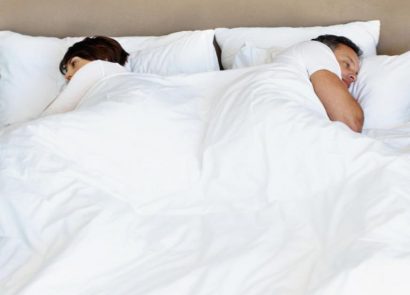Climbing into a bed after a long day really is the best. Your head hits the pillow and you wait for sleep to arrive, however, it’s not always so easy. Sometimes, even when you’re exhausted, you can spend ages lying there awake. We spoke with Nick Davies, leading UK psychotherapist and hypnotherapist (www.ndhypnotherapy.com) to find out how we can get a good night’s sleep, once and for all.
-
Ditch the tech
- Instead of watching TV or going on your phone, try reading a good book. “Your devices produce electromagnetic radiation which coupled with the adrenal stimulation you get from watching or reading what’s on them overstimulates your brain,” says Nick.
-
Keep it cool
- Try to keep your room cool before going to bed. “When we sleep, our body temperature drops as we become inactive in order to rest, and recuperate so a warm room will make you hot and bothered”. Opening a window, investing in a fan for the summer or turning the radiators off in the winter will keep your room cool. But, make sure you turn that fan off while sleeping to avoid a dry throat.
-
The darker the better
- “If you really want to drop off more quickly, blackout curtains or a sleep mask are essential,” suggests Nick. “When natural light starts to fade, our brains produce the sleep hormone Melatonin, which is produced in the pineal gland. It influences sleep by sending a signal to the brain that it’s time to sleep, our muscles begin to relax, thoughts slow down and our body temperature drops”. It also avoids being woken up by the sun in the morning during the long Summer days.
-
Lighten the colours
- Colours can really affect your sleeping. “Subdued colours are best and avoid red as it represents danger and will create a state of alertness. Soft hues are best as they are easy on the eye”. Your eyes are also affected by the lights from your phones and TVs, which is another reason to stay away from tech before bedtime.
-
Smell lavender
- Nick explains that “lavender has been proven to calm the mind and a 20-minute bath will allow all your muscles to relax pre-bedtime”. You can have a soothing bubble bath using lavender (but be sure not to fall asleep in the bath!). There are also many options for lavender products, such as pillow sprays, on the market specifically designed for sleep. Click here to check out a lavender pillow mist from Boots
-
Weighted blankets
- In 2020, more and more people suffering from anxiety have been buying ‘weighted blankets’ to reduce their anxious feelings. Neil compares the blanket to a duck feather duvet. “It weighs us down slightly to prevent tossing and turning and hugs us enough to feel like a warm embrace that produces oxytocins (the love hormone) and reduces the stress hormone cortisol”. The Gravity Blanket was one of the first on the market, click here to check out their products.
-
Sleep loose
- “Make sure your body is relaxed. You can test this by picking up and dropping each arm and let it flop back onto the bed cover,” advises Neil. “This is another technique to get that loose, limp feeling in your muscles that will promote good sleep”.
-
Just breathe
- “Once you’re in bed start taking slow, deep diaphragmatic breaths to calm your central nervous system down. It’s important to breathe diaphragmatically, as we do this when the danger has gone and it activates the ‘parasympathetic nervous system’ in the brain. This is responsible for returning the body to rest, relaxation and recovery. Instead of breathing where you expand your chest and lift your shoulders, push your stomach out to breathe all the way down to the bottom of your lungs, hold the breath then breath in a way where it’s like you’re letting out a loud sigh. Continue for 10 breaths”.
-
Let the voice put you to sleep
- That tiny voice in your head can be really loud before going to sleep, causing unrest and anxiety. Therefore, Neil suggests slowing it’s talking instead of trying to ignore it. “Slow that internal voice down to half the speed and change it to the sound of someone you find really boring. “By slowing this down and making it boring allows you to become disinterested in it and drop off”. Think of the voice of your old school teacher on an early Monday morning, you’ll fall asleep with ease!
-
Adopt a sleep schedule
- Helping to keep a sleep schedule will be able to help you sleep in the long term. “Set regular times for sleep and awakening to set your body’s clock,” explains Neil. “Your mind loves structure. The more regularly you do something the more it becomes an unconscious habit and the deeper embedded it becomes in your brain, so you don’t have to think about it consciously”.
If your child is the one not sleeping, here are 10 ways to help the little one off to the land of nod!





















